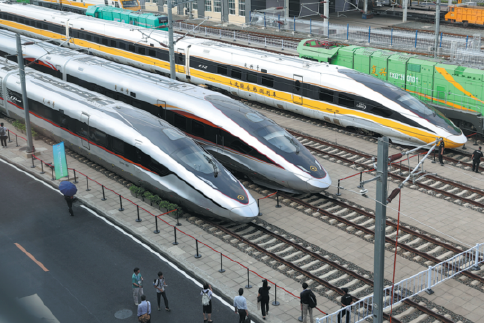Computing power offers new chances for tech firms


As companies roll out innovations, more data development potential is unleashed
China's computing power industry will usher in new development opportunities, as major Chinese tech companies have rolled out ChatGPT-like artificial intelligence chatbots, which necessitate higher requirements for computing capacity in the process of large language model training.
Computing power, which serves as a core productive force in the digital economy era, has become an important engine driving China's economic growth and unleashing the potential of data as a factor of production, experts said.
Zhang Yong, chairman and CEO of Alibaba Group and CEO of Alibaba Cloud Intelligence, said cloud computing serves as the best way to promote the large-scale application of AI. The group is committed to making computing and AI services more accessible and inclusive for enterprises and developers, he said.
Alibaba unveiled its AI large language model Tongyi Qianwen in April, joining the chatbot race and positioning itself as a potential rival to ChatGPT, an AI chatbot launched by US-based AI research company OpenAI.
Baidu AI Cloud, the cloud computing unit of Baidu Inc, China's largest online search engine firm, said the innovative integration of cloud computing with AI will lower the threshold for enterprises to acquire and use AI technology. Baidu rolled out its large language model and ChatGPT-like product dubbed Ernie Bot in March.
Zou Debao, deputy general manager of the AI industry research institute from market research firm CCID Consulting, said AI model training has huge demand for computing power, and with the increase of training intensity and computing complexity, the requirements for computational accuracy are also gradually rising.
China's total computing power scale now ranks second in the world, said the Ministry of Industry and Information Technology. By the end of 2021, superlarge and large data centers in use exceeded 450 nationwide, while intelligent computing centers surpassed 20, the ministry said.
The market scale of China's computing power segment exceeded 1.5 trillion yuan ($210.6 billion) in 2021, with revenue from cloud computing surpassing 300 billion yuan and internet data center services over 150 billion yuan, said the China Academy of Information and Communications Technology, a government think tank.
Last year, China launched a megaproject involving the construction of eight national computing hubs and 10 national data center clusters, indicating that its strategy to channel more computing resources from the country's eastern regions to its less-developed yet resource-rich western regions is in full swing.
Experts said building a national computing power network will enable the less-developed regions to handle and store data transmitted from the economically advanced areas, optimize resource allocation and enhance the efficient use of resources. That, in turn, will resolve excessive data surges and imbalances in regional computing capacity.
"Most of China's computing infrastructure is distributed in the eastern regions at present, while the western regions have the potential to foster the development of data centers and meet the needs of data computing in the eastern regions," said Yu Xiaohui, head of the China Academy of Information and Communications Technology.
Yu said the implementation of the east-data-west-computing project is conducive to optimizing the allocation of national computing power, utilizing green energy in the western regions, improving the energy efficiency of data centers and nurturing emerging digital industries.
Southwest China's Guizhou province has become a front-runner in China's big data industry since it was approved to host the country's first comprehensive big data pilot area in 2016. According to the Big Data Development Administration of Guizhou, the annual turnover of data circulation and transactions in the province will surpass 10 billion yuan by 2025.
Tech companies from home and abroad, such as Apple Inc, Huawei Technologies Co, Tencent Holdings Ltd and Alibaba Group Holding Ltd, have established their cloud computing and big data centers as well as regional headquarters in the province due to its cooler climate and ample power resources.
"With the rapid development and the commercial application of 5G, the internet of things, AI and the industrial internet, demand for data processing is increasing, which has driven the construction of data centers," said Xiang Ligang, director-general of the Information Consumption Alliance, a telecom industry association.
Chinese high-tech companies should utilize innovative technologies to improve data centers' operational efficiency and cut power and energy consumption, Xiang said.




































